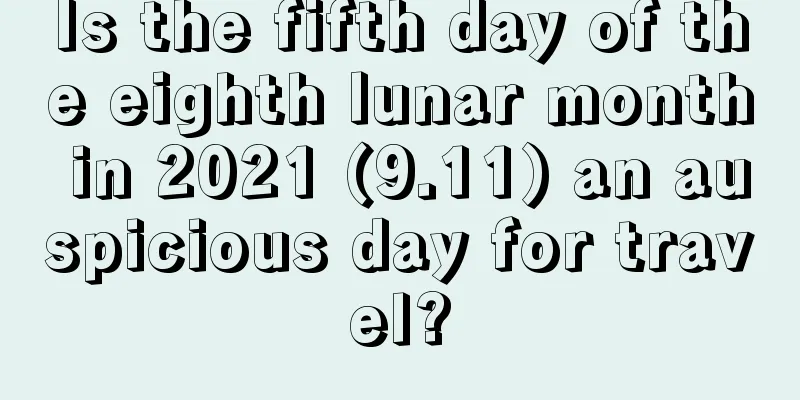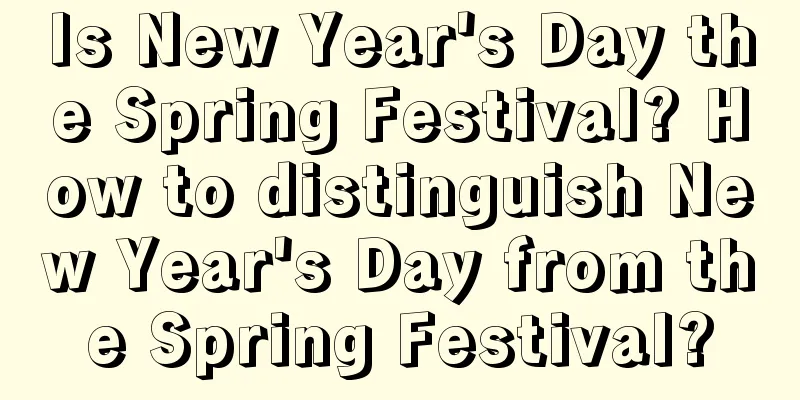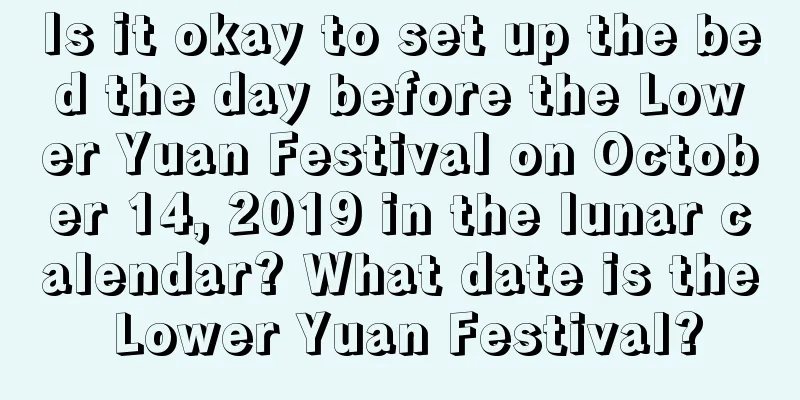What are the taboos during the Lantern Festival in 2019? Will there be a holiday?

The Lantern Festival is also known as the Shangyuan Festival, the Little New Year, Yuanxiao or the Lantern Festival. It is held on the fifteenth day of the first lunar month every year. So what are the taboos in the 2019 Lantern Festival? Is there a holiday for the Lantern Festival? The first month of the lunar calendar is the most important month in spring. Shuimoxiansheng.com brings you knowledge sharing about January. Please check out the special topic of the first month of the lunar calendar in 2019.What are the taboos during the Lantern Festival in 2019?1. On the Lantern Festival, it is best not to lend money to others, otherwise, it will be easy for others to borrow your luck this year.2. On the Lantern Festival, the rice jar and the flour jar should not be empty, because there is an ancient saying that running out of food is a disaster. 3. On the Lantern Festival, be careful not to tear your clothes. Otherwise, it is easy to be ruined and unlucky for a year. 4. On the Lantern Festival, avoid killing any living beings or seeing blood. Otherwise, this year is likely to cause financial loss, illness, and injury. 5. On the Lantern Festival, you should avoid using bad words or swearing. Otherwise, this year you may easily suffer misfortune due to your words or inadvertently saying the wrong thing. 6. Avoid washing or cutting your hair on the Lantern Festival. Because "fa" is like the word for getting rich, if you wash or cut your hair on this day, your wealth will be washed away and you will not be able to save anything for a year. Is there a holiday for the Lantern Festival in 2019?The Lantern Festival is not a legal holiday, and the 2019 Lantern Festival falls on Tuesday, so there is no holiday.Considering that the total number of national statutory holidays should not be increased at present, and the Lantern Festival is close to the Spring Festival, and although the Mid-Autumn Festival is also adjacent to the National Day, it has a greater impact, the Lantern Festival will not be added as a statutory holiday for the time being. In fact, in many places, units and businesses will take holidays on the Lantern Festival at their discretion. And if the Lantern Festival happens to fall on a Saturday or Sunday, it will be convenient for everyone. What are the customs of the Lantern Festival?1. Eating Tangyuan The traditional food custom of the Lantern Festival is to eat Tangyuan, which means reunion and auspiciousness. It is intended to bless the whole family to be reunited and harmonious, and to be healthy and happy in the new year. No matter in the north or south, on the fifteenth day of the first lunar month, the family will gather together to eat Yuanxiao. The name of the food "Yuanxiao" appeared in the late Song Dynasty and early Yuan Dynasty because people were accustomed to eating it on the night of the Lantern Festival. Yuanxiao is also called "Yuanxiao" and "Yuanzi". In the south, it is often called "Tangyuan" or "Shuiyuan". People in the Song Dynasty called it "Floating Yuanzi" because they saw it float in water after being cooked. In the Southern Song Dynasty, Zhou Bida's "Pingguo Xugao" recorded: "The floating dumplings cooked during the Lantern Festival seem to have never been compared by our predecessors..." "Sui Shi Zaji" said: "Cook glutinous rice into balls, and add sugar to make dumplings, which are called dumplings." The method of making it is to use colorful fruit baits and honey as fillings, wrap them with glutinous rice flour, roll them into balls, put them in water and cook them before eating. Yuanzi, like the balls used in lion and dragon dances, is a symbol of the moon. Eating Yuanzi represents the worship and appreciation of the moon. At the same time, Yuanxiao dumplings, like Mid-Autumn Festival mooncakes, symbolize family reunion.2. Guessing lantern riddles is a custom of the Lantern Festival. Juggling skills also appeared in the lantern festivals in the Tang Dynasty, riddles began to appear in the Song Dynasty, and opera performances were added in the Ming Dynasty. Among them, riddles have been developed and created through the ages. They are clever, lively and interesting, and are still very popular today. The so-called lantern riddles are riddles posted on lanterns, allowing people to guess the riddles while appreciating the lanterns. The answer to the riddle often focuses on the meaning of words, such as a character, a line of poetry, an object or a name. Since lantern riddles are difficult to guess, just like a tiger is difficult to shoot, they are also called "lantern tigers" (also called literary tigers). Lantern riddles are a language art created in my country. As early as the Spring and Autumn Period, sentences that were close to Liaohui and concealed were made into "secret codes". It was not until the Han and Wei Dynasties that they began to be called "riddles". 3. There is also a special custom of stealing green on the night of the Lantern Festival. There is a custom of stealing green in Guangxi. On this night, men, women, old and young would form teams and wait until late at night to steal vegetables from other people's gardens. This is called "stealing vegetables." It is said that this custom started after the middle of the Guangxu period, when Liu Fu Ti Biao Zhongying came here with his family. At first, there were only women and children, and what they stole was very little. By the Republic of China period, the whole family would go out together, and gradually it evolved into stealing after dinner without waiting until late at night. If the garden owners were a little careless, all the spoils would be wiped out, which was particularly troublesome. The custom of stealing green on the Lantern Festival (on the first day of the New Year in some places) is popular among all ethnic groups in Guangdong and Guangxi. 4. Walking on the bridge In some places, there is a custom of walking on the bridge during the Lantern Festival. Having to walk across three bridges in succession may be similar to the custom of "walking away all diseases" on the 16th. On the night of the 16th, men, women, old and young all have to walk around. Zhou Yong also wrote a poem called "Walking Away from All Diseases": "The capital's lantern market has always been prosperous, and all families share the same festival; all aunts, new brides and younger sisters-in-law make an appointment to dress up and walk away from all diseases. It is said that the ghost cave is empty on this night, and all diseases return to the dust; otherwise, there will be many diseases this year, with dry arms, dark eyes and headaches. Walking through the streets with a pair of beautiful shoes is better than drinking two cups of water prescribed by the doctor; which old woman doesn't go out? Breaking the hoof and walking in the room; this year I walk as healthily as last year, and I pray for a chance next year; an inch of fire from the mugwort leaves in Xinzhou only burns on other people's flesh; last year's companions are rare now, how many people can predict next year's walk? The owner of Chang'an is willing to stay, and quietly closes the door to laugh at the young people. I hope there is no moon on Mid-Autumn Festival, and I can get the rain and lanterns on Lantern Festival." 5. Playing with Lanterns Playing with lanterns is a custom that celebrates the Lantern Festival on the largest scale and with the most festive atmosphere. As the proverb goes, "The fire on the 30th (referring to New Year's Eve), the lanterns on the 15th (referring to the Lantern Festival)." It has the strongest color of entertainment, so it is called the Lantern Festival. Its main content is lanterns, so it is also called the Lantern Festival. The Lantern Festival was at its peak during the Sui and Tang dynasties. It usually started with the "lighting of lanterns" on the 13th, the "test lighting" on the 14th, the "main lighting" on the 15th, and the "lighting of lanterns" on the 18th. According to "Miscellaneous Records of Emperor Minghuang" by Zheng Chuhui of the Tang Dynasty, "When the emperor was in the Eastern Capital, on the night of the full moon in the first lunar month, he moved the procession to Shangyang Palace, displayed lanterns, set up fires in the courtyard, and lit candles from the Forbidden City to the palace courtyard. At that time, there was a craftsman from Fangdu named Mao Shun who was ingenious and made a lantern tower with twelve rooms, one hundred and fifty feet high, and hung pearls, jade, gold and silver. When the breeze blew, the lanterns made a melodious sound. The lanterns were in the shapes of dragons, phoenixes, tigers and leopards." According to "The Remaining Stories of Kaiyuan and Tianbao" by Wang Renyu of the Five Dynasties, "Madam Han (Yang Guifei's second sister) placed a hundred-branch lantern tree, eighty feet high, and erected it on a mountain. It was lit on the night of the Lantern Festival. It could be seen from a hundred miles away, and the brightness was so bright that it outshone the moonlight." The grand occasion can be seen from this. |
Recommend
When is New Year's Day 2022? Is it a good idea to move into new house on New Year’s Day?
New Year, new atmosphere, New Year's Day comes...
The sixth day of the second lunar month in 2018 is a good day according to the lunar calendar.
The lunar calendar determines whether a day is go...
Is the fate of a girl born on August 17th of the lunar calendar in 2019 good or bad?
The calendar is a rule that measures longer time i...
Can a funeral be held on the 27th day of the sixth lunar month in 2018? What does the hexagram show on this day?
Let’s see whether the 27th day of the sixth lunar ...
Where is the God of Wealth on May 12, 2017? Introduction to the God of Wealth
There is an important festival in the fifth month...
List of auspicious dates for marriage and engagement in June 2018
The sixth lunar month is already the middle of the...
What is the zodiac sign of a child born on June 27th of the lunar calendar in 2017?
Introduction: Constellations, like Chinese zodiac ...
Can I give a comb as a gift on Mother’s Day on May 13, 2018? Is it a good idea to give a comb as a gift?
Introduction: Mother's Day is an important hol...
Can we erect a monument on Qingming Festival on April 5, 2019? What are the requirements for erecting a monument on Qingming Festival?
Introduction: Qingming Festival is a festival for ...
Where is the God of Wealth at each time on the first day of the seventh lunar month in 2020
Where is the God of Wealth at different times on ...
What can’t you do on Valentine’s Day? Taboos on Chinese Valentine's Day
What can’t you do on Valentine’s Day? Taboos on Qi...
Is September 17th of the lunar calendar in 2021 a good day? Is it auspicious to install a bed?
The autumn wind is bleak and the weather is cold, ...
Which are the positions of the God of Wealth and the God of Happiness in the twelfth month of the first lunar month in 2021?
The arrival of the first month of the lunar calend...
Is it a good idea to hold the funeral on March 24th of the lunar calendar in 2022? Can the funeral be held?
The funeral also needs to be held at a good time. ...
Is it suitable to travel during May Day 2017? What should I pay attention to when traveling on May Day?
Introduction: Everyone knows that May Day is a leg...









